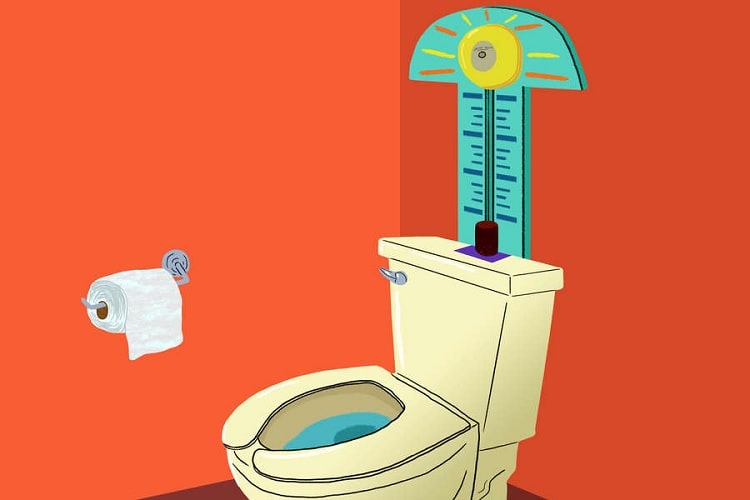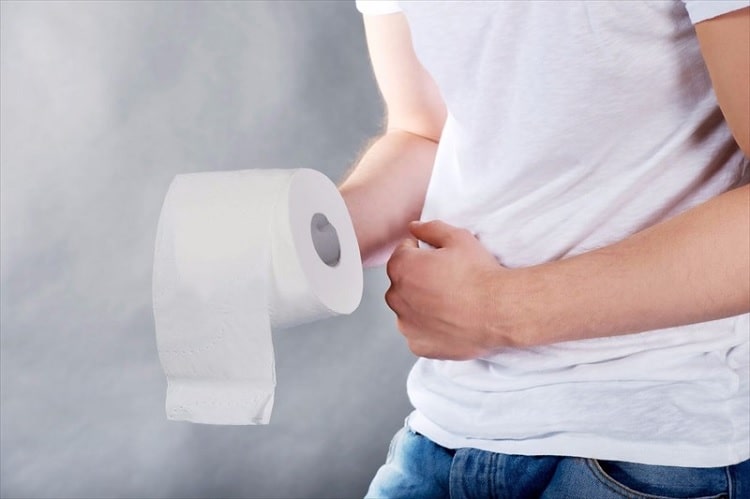Does pooping help you lose weight?
It sounds too good to be accurate, but there’s some truth. Pooping contains all of the fat you’ve consumed throughout the day, and when you get rid of that, your body receives an instant jump-start on burning calories. So if you find the answer to “Does pooping help you lose weight?” the answer is yes.
While it’s not a massive amount of calories (roughly 100 calories for an average bowel movement), it can add up over time. If you’re trying to lose weight, calorie burn is a good one. Even if you don’t have time to exercise for an hour at a time, having more frequent bowel movements will help you reach your goals.
The pooping myth started years ago when researchers noted that fat people defecate more than those with slimmer physiques. They thought having more bowel movements could help fat people shed pounds, but that has never been proven true.
You must eat and exercise regularly to get the slimming benefits of pooping. It’s not just a matter of being able to digest more fat when you poop, but also an issue of speeding up your metabolism.
If you lose weight due to having more bowel movements, then it’s probably because the frequent visits to the bathroom mean you’re eating less overall and burning more calories that way.
There is no hard evidence supporting how many bowel movements per day you should have to keep from gaining weight or losing it. It depends on your diet and how much physical activity you do each day.
If you’re trying to slim down, it couldn’t hurt to make getting in some time on the toilet a priority on your daily schedule.

How much does a poop weigh?
The average person excretes about one pound of fecal matter every day. Since human feces are mostly water and bacteria, it’s not a lot to carry around with you. Still, the weight of that poop can affect your back and other joints and may make it a little more challenging to walk or run.
So how much does a poop weigh? An average poop weighs 2 lbs when dry and 5-18 lbs when wet! This means the total weight is between 34 – 136 lbs in a lifetime! That’s quite an amount to carry around with you, no matter what your definition of “average” is. It’ll be almost as much as you weigh in your lifetime!!
It is also said that roughly 20% of the earth’s population suffers from constipation. And if you are wondering what the weight of human feces, including all those bacteria, it weighs 379 lbs. The bacteria in our guts can gain more than a pound over time.

Do you poop more when on a weight-loss diet?
Whether or not you poop more when on a weight loss diet is a heated topic. The simple answer is that you poop more when on a weight-loss diet. And no, it’s not just because everyone else is eating less; your body has to compensate for all the leftovers. Several things contribute to an increase in your daily bowel movements, and these can include:
- Less fiber intake
- Increased calorie intake
- Decreased fluid intake due to decreased activity levels
- Cutting out solid food and going solely on liquid diets
- Changing your diet to one with more processed foods
- Increased methane concentration
- Changes to the gut flora balance
Fiber is a bulking agent to keep your intestines healthy. Dietary fiber comes in two varieties, soluble and insoluble. Soluble fiber absorbs water and thickens to form a gel that helps move foods through the wasted time, reducing wasted time. Insoluble fiber helps ease bowel movements by adding bulk and absorbing liquid, speeding up transit time. Both fiber varieties are precious in maintaining regular bowel movements.
One of dieters’ biggest mistakes is going without fiber, leading to constipation. In today’s world, most foods have been stripped of their natural fiber content, and processed foods tend to lack fiber. To prevent constipation, eat plenty of whole grains, vegetables, and fruits. When consuming these foods, ensure they are eaten as Nature intended.
Your body does not digest fiber easily. For your body to break down and assimilate the nutrients in a thread, it needs enzymes from the friendly bacteria found in the intestines.
These friendly bacteria are called probiotics, and you must be sure your body has a healthy supply of them at all times. The best way to do this is to eat a whole foods diet (i.e., fresh fruits and vegetables, nuts, seeds, whole grains, etc.), supplement with an active form of probiotics such as Align or Bifantis daily, and take a digestion enzyme with each meal to ensure that you are breaking down all your food thoroughly.
Tips for Healthy Bowel Movements
Everyone’s been trying to eat healthier and work out more, but people have forgotten about their bowel movements. Most of us have avoided thinking about the process too much, but it’s essential to be aware of your bowel movements for a few reasons:
- Eat a healthy diet that includes non-starchy vegetables, fruit, whole grains, and lean protein such as fish or chicken.
- You should drink about 2 liters of water daily for optimal health and digestion. Simply drinking this much water will regulate the motility of your colon, promoting healthy bowel movements because it allows food to move through the GI tract faster.
- Don’t eat a lot of sugar and white carbs. They are not suitable for you, and they will slow down the transit time of food through your colon, resulting in irregularity.
- Exercise every day, but only exercise after you eat dinner. 30 minutes is the perfect amount of time; too much means you might have trouble falling asleep at night because your body will be using all that energy to digest your food.
- Get good sleep every night. This is because digestion takes place at night as per our body clock. Taking at least 8 hours of sleep is necessary.

Why should you not rely on pooping for weight loss?
If you think pooping is the key to weight loss, you may want to rethink that. Diets that claim to eat less or to poop more will help you lose weight are not backed by science. So how does the body regulate weight? The body does not hold weight based on pooping.
Most nutritionists and dieticians (who aren’t salespeople for specific weight loss products) will tell you that it’s a myth that pooping more or less will help you lose or gain weight – because the body regulates weight based on hunger and fullness.
Hunger and fullness are regulated by hormones in the brain, called ghrelin and leptin. Hunger increases during meals, which stimulates the hormone ghrelin; when food is digested, blood sugar rises and triggers another hormone called insulin; when insulin levels fall again (from a meal), ghrelin levels drop, triggering satiety signals to reach fullness; while we digest our next meal. These signals work in conjunction to produce a regular and stable weight.
There are no proven ways to increase or decrease your pooping frequency to help you lose weight. Simply eating less or eating more will lead to either gain or lose of weight, respectively, based on the energy (calories) consumed versus expended by the body.
Conclusion
So, there you have it, pooping is not the key to weight loss. Diets claiming that pooping more or less will help you lose or gain weight are not backed by science.
Diets and products that promise to shed pounds by increasing your pooping are likely ineffective or even dangerous if they contain laxatives or purgatives. These can cause dehydration and electrolyte imbalance, which could cause serious complications. Always consult your doctor before trying any weight loss diet.
Faqs
Average poop weighs between 1/4 and 1 pound. Poops are heavier in larger people who eat more and beverage more or in people who have less regular bowel movements.
When we poop, we do lose a small amount of weight, but it is ineffective at helping us lose the body fat that has the biggest impact on our health. The most dangerous type of body fat, according to experts, is the fat that gathers around the waist.
Your stools might get tough, chunky, and uncomfortable as they exit your system. Constipation can also result from cutting out carbs from your diet, which is frequently a go-to weight-loss strategy.






